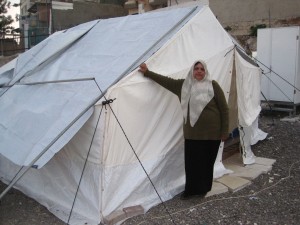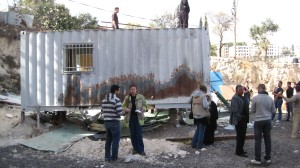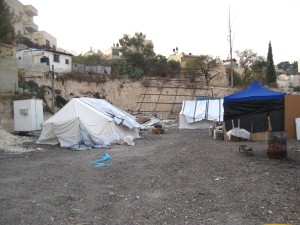Our morning plans were interrupted by a text from the UN informing us that there was a house demolition in progress in a neighborhood here in East Jerusalem. In wanting to accompany people, especially in times of distress, we felt it was important to get there as quickly as possible. The taxi ride was slower than we hoped as traffic was pretty gnarled, but within 20 minutes we were climbing out of the taxi to walk the extra few blocks past a police barricade. Walking down the hill, we encountered an earth moving machine and 25 to 40 police leaving the scene.
Having heard that demolitions can happen in as little as15 minutes, I assumed we would just find a pile of rubble and dust. What we found was very different than I expected.
To describe the housing situation for a large part of the Palestinian population in East Jerusalem and the West Bank, I’ll start by saying it is very difficult. People may have owned land for generations and may have all the proper deeds to the land, but still find it impossible to legally build on their land or obtain permits for even the smallest addition or structural change. Not infrequently people spend years and sometimes much money trying to get permits, only to finally resort to building without a permit. It is virtually impossible for the average Palestinian to obtain a building permit. In many sections of East Jerusalem, Jewish settlers have been buying properties, often by dubious means, and moving into houses where evictions have taken place. It is no secret that laws are not applied equally to Palestinian and Israeli citizens.
The house in question was built on land with a beautiful view of the Mt. of Olives, and as we were told, had been in the family for several generations. It was built without a permit, using two containers that were connected, supported by posts but also sitting on a truck.
The family’s understanding was that by law if it could be moved a certain amount it was legal. For six years this approximately 500 sq. foot structure was home to Musa and Aida Subah and their family, now numbering 13: the parents, their 4 sons and 3 daughters, 2 daughters-in-law, and 2 granddaughters. Though rudimentary on the outside, it was pleasant on the inside with attractive tile flooring, a refrigerator, bedrooms and a living room, an air conditioner, plumbing and electricity.
What we saw as we approached was a house with the front ripped off, the floor torn through and the stairs dismantled; all the contents were on the ground outside; the floor tiles had been neatly piled on the ground; and most surprising, about 5 strong-bodied family members were whacking at the ceiling and tearing at walls to further tear it down. The house was being demolished by the family!
Two days earlier the Subahs had been notified by the municipality that their house was scheduled for demolition. Within those two days they had to pay fines of 20,000 NIS (shekels equaling more than $6,000). On this day the police and earth mover had shown up on their property for the demolition. Those had come and gone, maybe satisfied to see that the family was in the process of taking down the house themselves. At any rate, they were only given 24 – 48 hrs. to have the land totally cleared of all evidence of a house or their belongings. If the police come back to an unfinished demolition, the family will be charged either 20,000 NIS more (or other team members heard 100,000 NIS, about $33,000) and the father would be sent to jail.
Besides family and some youth who got shooed away, there were a few others besides our team of four, including a tv cameraman, UN people interviewing the couple, and a man named Fakhri who is very active in another threatened neighborhood, Silwan.
Needless to say, this was a terrible hardship for Mr. & Mrs. Subah. I cannot imagine how it felt to have to pay enormous fines as well as destroy their own home. They said that after things calm down they will probably put up a tent on their land; as a temporary structure it can also be demolished, but would not be that difficult to put up again. What effect does this have on children? One day they have a secure house, the next day coming home from school, they stare with vacant eyes at the wreckage that was home.
The family was gracious. The parents agreed to be photographed by us and were glad to answer our questions. As we left, Musa said, “Thanks for coming. Pray for us. We have no home. I will be alone.” He was grateful that we would tell his story. (written 21 Dec ’10)
PART II
Today, nine days later, our team decided to revisit the Subah family. More surprises were in store! As we walked down the hill once again toward their property, I fully expected that the land would be completely cleared and that we would need to ask around the neighborhood in order to locate the family. Instead, when we got to their lot we saw three good-sized tents firmly staked.
We approached the tents, calling out to see if anyone was home. Soon a very smiley Aida appeared, greeting us enthusiastically with hugs and kisses on both cheeks. She invited us into a very cozy “room”, complete with carpet, 4 beds, a heater, a gas burning stove and a table. Within minutes, in typical Palestinian graciousness, we were being served tea. As Aida and our teammate Maria chatted animatedly in Arabic, we learned that
many of their needs had been taken care of through the UN and the Red Cross. It seemed that along with tents being provided, they were also given gas burners, heaters, blankets, and the ability to stay on their own land.
There was evidence all around that the family and extended family had worked very hard and done what they could to make the best of the situation. First of all, they managed to follow through with the self-demolition, a daunting task. Furniture had been moved into the tents; one tent had been turned into a kitchen, complete with refrigerator and cupboards with countertops; blankets had been hung on the walls of the tents, warding off some of the cold and adding to the sense that a home had been made.
Best of all was seeing the resiliency and undertone of joyful living: father and sons returning to work; warmth and laughter with neighbors stopping by; and turning outside of themselves to provide a great celebration as they fling open their hearts to neighbors, friends and family in an invitation to a grand feast on New Year’s Eve!
Musa had asked for prayer. God had answered with bringing much assistance and hope to the family. Can we pray that on a bigger scale some of the injustices would be stopped that bring on this misery and hardship for so many people? (written 30 Dec ’10)
Part III
These things are not simple. On New Years Eve when the Subahs were to have their party, we had tremendous rains. The rain has been badly needed here, but was not a good thing for their party. I doubt that they had it.
The crowning disappointment came later with the news that the Subah family had been given notice to remove their tents in five days. What will be next? (written 1 Jan ’11)






Ruth, thanks for your heart warming…and wrenching account. I’m posting a link to my facebook page. Bless you for being there. I know it means a lot to the family and I pray for justice and peace for the family.
Andy – Thanks for your comments, reading our blogs, your prayers, interest, and even linking us to your facebook page. Very nice. Hope all is well with you. Ruth
Thank-you for writing Ruth. This is very important I see-to be a witness.
Leslie – Thanks for your comment. My blogging has been rather spotty. Wayne has been much more prolific. But, we are going through some pretty amazing exeriences here and it certainly is a privilege to be getting to see things first hand.
I hope you all are doing well. Love, Ruth